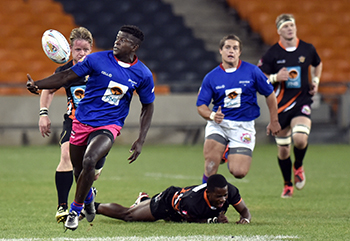Latest News Archive
Please select Category, Year, and then Month to display items
12 October 2020
|
Story Arina Engelbrecht
|
Photo Supplied
 Arina Engelbrecht from Organisational Development and Employee Well-being believes physical activity has a number of benefits for one’s health, including stress relief.
Arina Engelbrecht from Organisational Development and Employee Well-being believes physical activity has a number of benefits for one’s health, including stress relief.
Being physically active plays a big role in preventing the development of mental-health problems and in improving the quality of life of people experiencing mental-health problems.
Treatment for depression
Physical activity can be an alternative treatment for depression. It can be used as a stand-alone treatment or in combination with medication and/or psychological therapy. It promotes all kinds of changes in the brain, including neural growth, reduced inflammation, and new activity patterns are formed that promote feelings of calm and well-being. It releases endorphins – powerful chemicals in the brain that energise your spirit and make you feel good.
Physical activity can be very effective in relieving stress. Research in adults has found that physically active individuals tend to have lower stress levels compared to individuals who are less active. It also leads to improved sleep. When a person sleeps better and feels more rested, overall quality of life improves. They cope better with daily life stressors.
Reduce Alzheimer's risk
Regular physical activity can reduce your risk of developing Alzheimer's disease by up to 50%. It can also slow down further deterioration in those who have already started to develop cognitive problems. It stimulates the brain’s ability to maintain old connections as well as to make new ones.
A study asked people to rate their mood immediately after periods of physical activity (e.g. going for a walk/run, cycling, doing housework) and periods of inactivity (e.g. reading a book or watching television). Researchers found that participants felt more content, more awake, and calmer after being physically active compared to after periods of inactivity.
In conclusion, people who are physically active feel a sense of well-being, feel more energetic throughout the day, sleep better at night, have sharper memories, and feel more relaxed and positive about themselves and their lives.
“Being physically active not only changes your body, it changes your mind,
attitude, and your mood.” – Arina Engelbrecht
Mafuma aims at elusive tournament victory with Junior Springboks
2016-06-03

The University of the Free State’s Mosolwa Mafuma
recently scored five tries in the Junior Springboks’
three practice matches against a Golden Lions U20
invitation team, a Maties team, and the
South Western Districts. Photo: SASPA
He has never won a rugby tournament, so Mosolwa Mafuma has only one goal: to win the Junior World Cup as Junior Springbok in England.
Even though the 20-year-old Shimlas wing has achieved success, and it is pleasing to excel individually, he believes it is more satisfying when his team triumphs. According to Mafuma, who could just as well be an athletics star, he wants to help the South African U20 team take a different approach.
He and the prop Kwenzo Blose are players from the University of the Free State who will represent the Junior Springboks from 7 to 25 June 2016 in Manchester. The team will play the first of three group matches on 7 June 2016 against Japan in the Academy Stadium.
New approach for SA U20 team
Mafuma, who was Player of the Tournament in his first Varsity Cup in 2016, says the Junior Springboks are well prepared. “We have the skills, and the structures at the Junior Springboks are different than before. There is not just one game plan like playing with big guys. We want to try new things and have a different approach.”
It is with this team that he wishes to achieve something. “It is one thing to be able to say that you are the Player of a Tournament, but your team did not win. I have not won something at school (with St. Benedict’s Boys College in Johannesburg) or this year with the Shimlas.”
Speedster on athletics track
The speedster is one of only a few rugby players who also have a profile on the IAAF website. His fastest time in the 100 m is 10.37 seconds (a national U17 record) and 20.37 s in the 200 m.
In high school, this first-year Psychology student played rugby during winter and took part in athletics during summer. Only at the end of Grade 11 did he started focusing on rugby. “I was more of an athlete than a rugby player,” he says.
It is no coincidence that the nickname he acquired due to his speed, is Dash. His other nickname, Senkie (derived from the Afrikaans word ‘seuntjie’) he received as a child from his parents because he was such a small child.